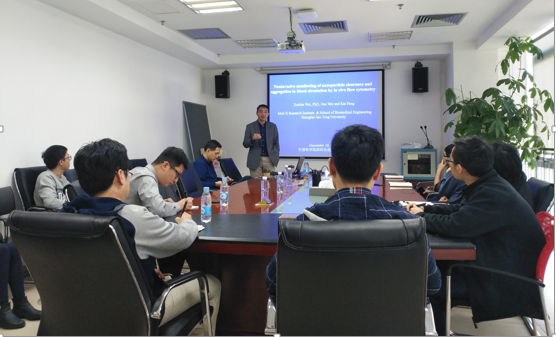Professor Wei Xunbin, a Distinguished Professor at Shanghai Jiao Tong University, a National Outstanding Youth Fund recipient, and a Fellow of the Society of Photo-Optical Instrumentation Engineers (SPIE), visited our institute for academic exchanges on December 18, 2018, and delivered an academic report titled "Noninvasive monitoring of nanoparticle clearance and aggregation in blood circulation by in vivo flow cytometry". The report mainly introduced the principles, key technical points, and application status of the unique in vivo flow cytometer developed by his team. At the same time, it elaborated in detail that the in vivo flow cytometer innovatively combines various technologies such as nanoprobes, window detection methods, and data analysis, enabling highly sensitive detection of continuously circulating tumor cells in living animals. Currently, his team is leading the clinical transformation of this technology, which is expected to provide a non-invasive, continuous, and highly accurate monitoring method for tumor metastasis.

Professor Wei Xunbin communicated with the teachers and students of Shenzhen Institutes of Advanced Technology
Personal Profile:
Xunbin Wei, Distinguished Professor at Shanghai Jiao Tong University, recipient of the National Science Fund for Distinguished Young Scholars, and Fellow of SPIE (International Society for Optics and Photonics). He obtained his Bachelor's degree in Optoelectronic Technology from the Department of Physics at the University of Science and Technology of China in 1993, and earned his Ph.D. in Biophysics from the University of California, Irvine in 1999. From 1999 to 2001, he conducted postdoctoral research at Harvard Medical School. He served as a Research Assistant Professor at Harvard Medical School from 2001 to 2006. Returning to China in 2006, he became a researcher and deputy director at the Institute of Biomedical Sciences of Fudan University, as well as a professor in the Department of Chemistry. He has published over 70 SCI papers in journals including Nature and PNAS. He holds one Class III Medical Device Registration Certificate and over ten domestic and international patents. Currently, he serves as a Distinguished Professor at Shanghai Jiao Tong University (School of Biomedical Engineering and MED-X Research Institute), leading the Biomedical Instrumentation discipline. He is a 2014 recipient of the National Outstanding Youth Science Foundation, SPIE Fellow, Vice Chairman of the Medical Instruments Branch of China Instrument and Control Society, Deputy Director of the Laser Medicine Committee of the Chinese Optical Society, Standing Committee Member of the Molecular Imaging Committee of the Chinese Biophysical Society, and Standing Committee Member of the Biomedical Photonics Committee of the Chinese Optical Society. He serves as Associate Editor for Cytometry Part A (impact factor 3.71) in cell analysis, and as a review expert for the National "Thousand Talents Plan" and the National Natural Science Foundation's Medical Division. His research focuses on optical imaging detection of tumors, cell manipulation techniques, and phototherapy methods for Alzheimer's disease.